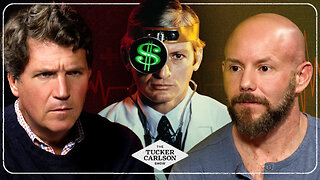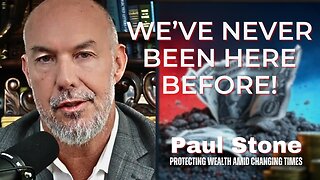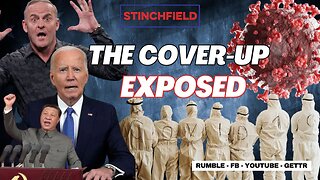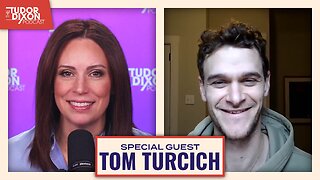Premium Only Content

Shapes Of Things Heart Full Of Soul For Your Love Stroll On The Yardbirds
Shapes Of Things Album: Birdland (1966)
Heart Full Of Soul Album: For Your Love (1965)
For Your Love Album: For Your Love (1965)
Stroll On Recorded for the film Blow-Up (1966)
by The Yardbirds
When Yardbirds drummer Jim McCarty was asked him about writing a hit song. He replied: "That's probably the hardest thing to try and do. Every time we tried to do that it never really succeeded. I suppose we were lucky in that when we did 'Shapes of Things' it was like a hit song, but we were really coming from not trying to create a sort of a 3-minute piece of music, it was just something that seemed natural to us. We started with the rhythm, we used a bass riff that came from a jazz record, got a groove going with that and then added a few other bits from elsewhere, other ideas that we'd had. And I think it was a great success for us, it was a good hit record that wasn't really selling out. And it was original."
Explaining how they composed Shapes Of Things, McCarty added: "I came up with a marching type of rhythm that I tried to make interesting. And at the end of each line we'd build up like we used to do with some of our stage stuff - the rave ups. And then the bass riff came on top of that. And the bass riff was loosely based on a Dave Brubeck song, sort of a jazz song, around a doo doo doo doo doo doo, and then the chords came over that. The chords were very basic, came between the two tones, I think G and F, and then resolving it in D, each verse. And then the tune came on top of that. In fact, I remember putting the backing track down, which sounded great. I wasn't at the session where Keith made up the tune, and when I heard the tune, I thought, Oh, that's great. It's a real surprise. He made up the tune, and then we had this sort of 'Come tomorrow,' but that was part of the song, anyway, at the beginning. So it was an exciting song to be involved in."
Jim McCarty said: "'Shapes of Things' was very much about the state of the situation in the country with the Vietnam War, so it was sort of an anti-war song."
In 1995, three years after The Yardbirds were inducted into the Rock and Roll Hall of Fame, the band reformed, eventually releasing the album of new material Birdland in 2003. Bass player Chris Dreja says of Shapes Of Things on their website: "I think 'Shapes of Things' is one of the finest things the band ever did. It was the first recording done at Chess in Chicago. They just nailed our sound. It's a great song to play live. When you hit that chord for the solo part, then a little pause, then you get that BANG where the solo comes in. It's just a magic moment."
Shapes Of Things was used in the 1989 movie Slipstream.
Drummer Jim McCarty (August 2011, on The Yardbirds website): "We were definitely surprised when we discovered that we could write hits without outside writers. With Jeff Beck it became very much a team effort. Some of us did some things well and some of us did other things well. We put all of those things in a pot and it just all seemed to work. I always fancied 'Shapes Of Things' as being the Yardbirds' best single. That song had all the elements. Good tune, good lyrics, good rhythm and a great guitar solo by Jeff. That song was really the band at that point."
Jeff Beck included "Shapes Of Things" as the first track on Truth, the first album by the Jeff Beck Group. This version has lead vocals by their lead singer, Rod Stewart.
Heart Full Of Soul was written by Graham Gouldman, who later formed the band 10cc. Gouldman was a prolific songwriter who also came up with songs for The Hollies, Cher, The Shadows, and Herman's Hermits. For The Yardbirds, he provided three of their hits, also composing "Evil Hearted You" and "For Your Love." Yardbirds drummer Jim McCarty said in our 2010 interview: "'Heart Full of Soul,' which was very moody, gave us the ability to play the riff in sort of an Eastern way, give it an Oriental touch. Another very good song."
Lead guitarist Jeff Beck employed an early use of a fuzz box on his lead part in Heart Full Of Soul. The original arrangement called for a sitar playing the lead guitar part, but they instead opted for Beck's sitar-sounding guitar.
The roots of sitar blended into rock started November 1964, when Brian Auger engineered the first recording of "Heart full of Soul" by the Yardbirds. An authentic Indian sitar player was brought into the studio, as well as a tabla player who could not get the 4/4 time signatures right. Since The Yardbirds were a road group and the original could not be played to live audience, Jeff Beck stood in and used his fuzz machine with a tone blender that created a similar and extremely effective sound.
Heart Full Of Soul was one of many songs at the time that was influenced by Eastern music. It was released five months before the Beatles' "Norwegian Wood (This Bird Has Flown)," which featured George Harrison playing the sitar for the first time in Western pop music.
The members of Rush practiced Heart Full Of Soul a lot when they were first starting out. In their teens they would play this song often. It is one of eight songs Rush covered on their 30th anniversary album Feedback.
Drummer Jim McCarty (August 2011): "[After 'For Your Love'] We were actually quite pleased that we finally had a big hit. We felt that now we could carry on and move onto the next level as a band. Definitely having a big hit opened us up to bigger venues and nationwide tours. Then Graham came to us with 'Heart Full Of Soul' and we felt that was the perfect follow up. It became a hit as well and we were on our way. We knew we were now in a position where we had to come up with hit singles on a regular basis. But we were all for it and were happy to carry on and start experimenting."
For Your Love was written by Graham Gouldman, who later became the bass player for the group 10cc; he wrote two other Yardbirds hits as well: "Heart Full of Soul" and "Evil Hearted You."
Musically, Gouldman was inspired by The Animals' version of "The House Of The Rising Sun." for For Your Love
"There's a general sort of popular chord sequence which is C, A minor, F and G," Gouldman told Songfacts. "Well, 'House Of The Rising Sun' is pretty much the opposite of that. So, it starts on a minor and goes to the relative major instead of the other way around, and I really responded to that, it resonated with me. I became so enamored with the sequence that I used it on the first two chords of 'For Your Love.'"
For Your Love is one of the most famous rock songs to feature a harpsichord, which was arranged by Yardbirds bassist Paul Samwell-Smith, who made wholesale changes to Graham Gouldman's original demo. Gouldman observed to Uncut magazine August 2009: "The harpsichord was an absolute stroke of genius. The record just had a weird, mysterious atmosphere about it."
The Yardbirds wrote many of their own songs as a group, but had some of their biggest hits with the ones Gouldman wrote. What did they think of Gouldman's songs? Yardbirds drummer Jim McCarty told us: "Well, they were always very original. Very interesting songs, very moody, because they were usually in a minor key, the ones we did, anyway. 'For Your Love' was an interesting song, it had an interesting chord sequence, very moody, very powerful. And the fact that it stopped in the middle and went into a different time signature, we liked that, that was interesting. Quite different, really, from all the bluesy stuff that we'd been playing up till then. But somehow we liked it. It was original and different."
The Yardbirds didn't have a lot of hits, but were one of the most influential and original bands of the '60 and an easy pick for the Rock and Roll Hall of Fame, which they entered in 1992. Having a hit song was important to them, however, and For Your Love provided that. Jim McCarty said: "To try and get a hit song in those days was quite a difficult thing to do for us. We could come up with ideas, but our first hit song was very important for us. And with 'For Your Love' we heard it and had the demo of it and it sounded like a hit song to all of us. Yeah, there wasn't a problem doing that. It was the sort of thing that you relied on to get into that other echelon, to have a hit song. All our contemporaries were having hit songs: The Beatles and the Stones and the Moody Blues and Animals, they were all having #1 hits and we were really trying to keep up."
For Your Love almost didn't get recorded by The Yardbirds. Gouldman, 19 at the time, wrote it for his own group The Mockingbirds, but their demo was turned down by Columbia. Also it is believed that producer Mickie Most turned it down on behalf of Herman's Hermits and that the Animals also turned it down.
For Your Love found its way to The Yardbirds after their manager ran into the fledgling songwriter Gouldman when they were opening for The Beatles at a 1964 Christmas show. Gouldman loved how The Yardbirds would change tempo in the middle of a song, which is how he wrote "For Your Love."
For Your Love prompted Eric Clapton to leave The Yardbirds, since he felt their music was becoming too commercial. He was replaced by Jeff Beck, who was later replaced by Jimmy Page. Clapton joined John Mayall's Bluesbreakers and would later be a member of Cream and Derek and the Dominos. One of the contributing factors to Eric Clapton's departure was, while performing the song live, his having to recreate the song's harpsichord on a 12-string guitar.
The harpsichord on For Your Love was played by session musician Brian Auger, who later became a solo artist of note. His biggest hit was the Bob Dylan song "This Wheel's On Fire," which was credited to Julie Driscoll With Brian Auger And The Trinity. It later became the theme tune for the BBC comedy show Absolutely Fabulous.
The Yardbirds were known as a great live band, but the recording technology of 1965 limited their commercial potential, as the songs they wrote themselves didn't play well in a studio setting. McCarty told us how For Your Love gave them a breakthrough: "All the stuff that we played live and we recorded in the studio, it just sounded really tame. The studios weren't so good then, they weren't really geared for playing rock and roll or blues music. And all the ideas that we'd had up to 'For Your Love' just sounded awful. And so 'For Your Love' was the song that would sound good anyway, because it was a much more commercial song."
On The Yardbirds official site, bass player Chris Dreja said of For Your Love: "We owe a lot to that song because it sort of pulled us out from national to international and set the template for us - that time change in the middle, the weirdness of it."
For Your Love appeared in the movies Fear And Loathing In Las Vegas (1998), Harimu Ogen (1985) and Deadly Advice (1994).
Fleetwood Mac recorded this for their 1973 album Mystery to Me and released it as a single.
Keith Relf - lead vocal
Eric Clapton - guitar
Chris Dreja - guitar
Paul Samwell-Smith - bass
Jim McCarty - drums
Non-Yardbirds brought in to play were:
Ron Prentiss - acoustic bass
Brian Auger - harpsichord
Denny Piercey - bongos
For Your Love was covered by Greg Kihn in 1994. It was also used in the movies Fear and Loathing in Las Vegas (1998) and Pirate Radio (2009).
For Your Love was used in commercials for Zales jewelry.
The Yardbirds also recorded "Stroll On", a reworking of "Train Kept A-Rollin'", recorded for Michelangelo Antonioni's critically acclaimed film Blow-Up. Relf changed the song's lyrics and title to avoid having to seek permission from the copyright holder. Their appearance in the film, about a hip fashion photographer (played by David Hemmings) undergoing an existential crisis in Swinging London, came after the Who declined and the In-Crowd were unable to attend the filming. Andy Warhol's "Factory" band The Velvet Underground was also considered for the part but was unable to acquire UK work permits. Director Antonioni instructed Beck to smash his guitar in emulation of the Who's Pete Townshend. The guitar that Beck destroys in the film was a cheap Höfner instrument.
Set within the contemporary mod subculture of Swinging London, the film follows a fashion photographer (Hemmings) who believes he has unwittingly captured a murder on film. The cinematographer was Carlo di Palma. The film's non-diegetic music was scored by American jazz pianist Herbie Hancock, and The Yardbirds are seen performing "Stroll On".
In the main competition of the 1967 Cannes Film Festival, Blowup won the Palme d'Or, the festival's highest honour.
-
 13:00
13:00
Psychological operations
8 days agoJason Voorhees The Knife Deathshot The Chuck Norris Experiment
49 -
 53:39
53:39
PMG
3 days ago $0.35 earned"Allegations Against Diddy & Usher, $150K Bounty on Trump, RINO Speaker Caves w/Steve Baker"
1.01K -
 1:31:21
1:31:21
Tucker Carlson
4 hours agoBrigham Buhler: UnitedHealthcare CEO Assassination, & the Mass Monetization of Chronic Illness
158K142 -
 2:29:04
2:29:04
Nerdrotic
5 hours ago $9.80 earnedHappy New Years - Nerdrotic Nooner 454
62.3K7 -
 32:20
32:20
Rethinking the Dollar
4 hours agoThe U.S. Debt Crisis That Was "Made In America" w/ Paul Stone
44.1K9 -
 3:31
3:31
SLS - Street League Skateboarding
1 day agoCoco Yoshizawa’s 3rd Place Finish at SLS Tokyo 2024 | Best Tricks
34.9K5 -
 46:15
46:15
Grant Stinchfield
1 day ago $12.15 earnedNew: The COVID Cover-up Revealed! Team Biden Caught in a Big Lie!
36.1K17 -
 2:35:08
2:35:08
The Shannon Joy Show
19 hours ago🔥🔥LIVE Exclusive W/Daniel Horowitz - New Year 2025 Analysis On Culture, Economy & Politics🔥🔥
45.8K15 -
 33:14
33:14
Tudor Dixon
4 hours agoThe World Walk with Tom Turcich | The Tudor Dixon Podcast
36.5K1 -
 7:29:48
7:29:48
PudgeTV
10 hours ago🔴 Gaming on Rumble - Marvel Rivals | Iron Man's Armory: Equipping Groot and Jeff for Battle
40.5K3